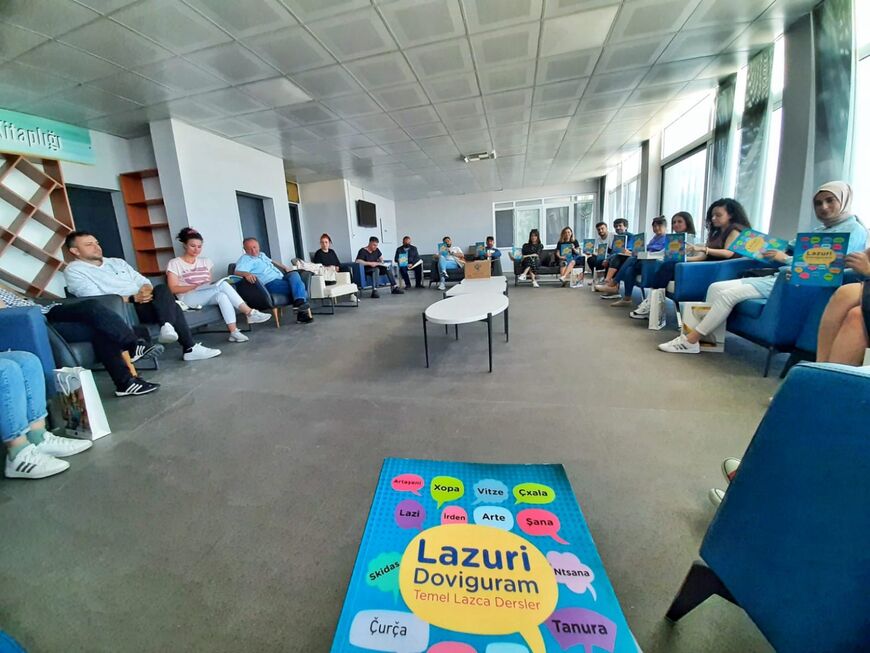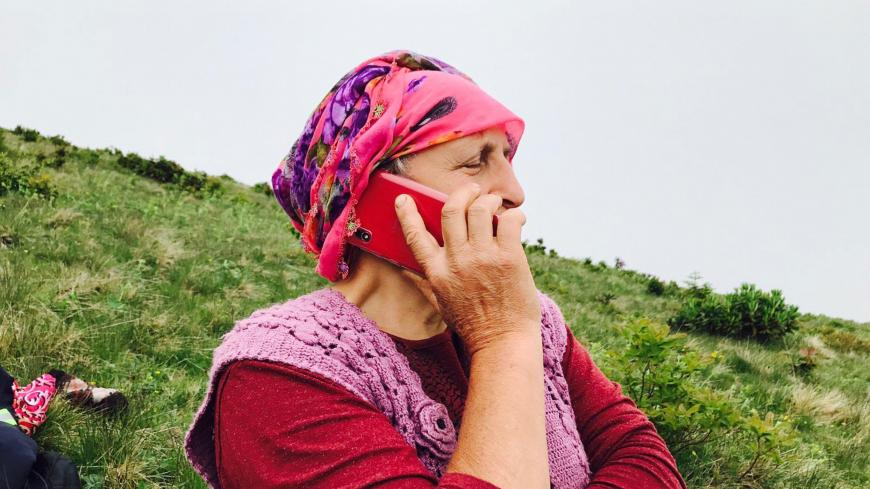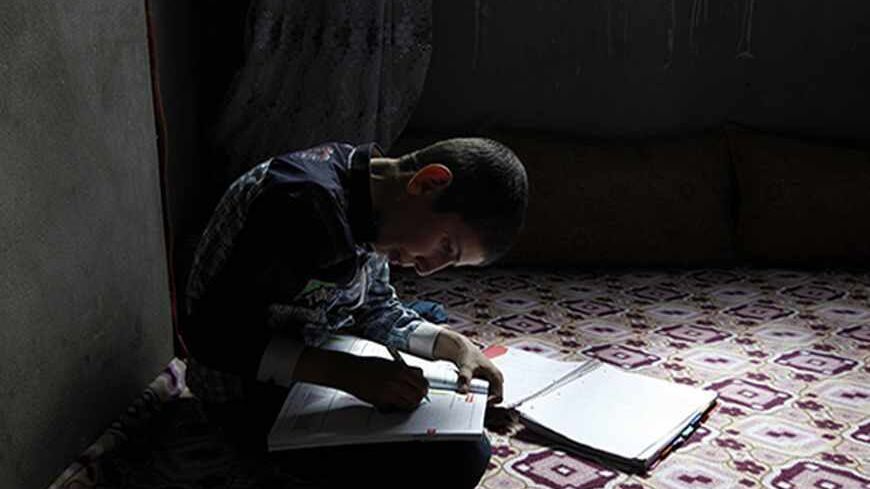Can AI save Turkey’s endangered Laz language?
With few young speakers and little official support, activists are turning to artificial intelligence to help preserve one of Turkey’s endangered languages: Laz.

ANKARA — In the misty mountains and coastal towns of Turkey’s eastern Black Sea, the Laz language, which once echoed through the lanes of small villages, now lingers mostly in the quiet houses of great-grandparents, and activists are turning to AI in a bid to prevent it from vanishing.
The Istanbul-based Laz Institute has been seeking Laz volunteers to train AI in the language through Mozilla’s Common Voice program, creating a digital archive that could preserve the language increasingly under threat of extinction. Experts, however, caution that other methods — including education, institutional support and community engagement — are needed to keep the Laz language alive.
Laz, a South Caucasian language, is spoken mainly in Turkey’s northeastern Black Sea provinces of Rize, President Recep Tayyip Erdogan’s hometown, and Artvin, near the border with Georgia. To a lesser extent, it is also spoken in Turkey’s northwestern Marmara region and in parts of southwest Georgia.
Laz people in Turkey are often associated with qualities long woven into the country’s folklore and jokes: short tempers, candidness, and sometimes a tendency to overthink. Turkey’s famous comedian Cem Yilmaz offers a glimpse of this temperament in a personal anecdote with a Black Sea local from a region whose people, whether Laz or not, share many of the same traits: when asked for directions to the airport, the local paused and deadpanned, “Airport? You mean the one … for airplanes?”
A fading language
In addition to these playful stereotypes, ethnic Laz people confront a more serious reality: They are striving to assert their identity as a distinct community with a language, traditions and customs. UNESCO classifies the Laz language as “endangered,” citing shrinking daily use, weakened transmission to children and its lack of an official status in either Turkey or Georgia.
As Turkey does not collect official data on ethnic populations, the exact number of Laz people living in the country is unknown, though estimates place them close to 600,000. Among them, only half are believed to actively speak Laz.
According to Irfan Cagatay, the author of "The Laz in the Late Ottoman Empire 1877-1923," one of the most comprehensive studies on Laz identity in Turkey, the decline of the language sped up after the founding of the modern Turkish Republic, as nation-building efforts discouraged people from speaking Laz and any other minority language. In 1924, the country established Turkish as the official language of instruction, sidelining the education of other Muslim-minority languages in schools.
“Turkish authorities prioritized the language as a marker of unity, extending government services, schools and public life in Turkish,” Cagatay told Al-Monitor.
Urban integration brought Laz communities further into Turkish society as a whole, Cagatay added. Long isolated in the steep mountains of the Black Sea, residents had less incentive to use Laz in daily life, and more reason to speak Turkish.
“Eventually, Laz turned into a language spoken only by grandparents or even great-grandparents’ houses,” he added.
Teaching Laz to AI
As Laz gradually retreated from daily life, activists sought new ways to preserve it, and the Laz Institute has been at the forefront of these efforts for more than a decade.
The institute’s most recent initiative is turning to AI to create digital archives of the language. The initiative has been working for two years to integrate Laz into Mozilla’s Common Voice program, an open-source platform that trains voice recognition technology using recordings submitted by ordinary speakers.
Image taken during the Laz language education for teachers in 2022 (Laz Institute)
“This project is important not only for increasing Laz’s visibility and raising awareness about the language,” Ismail Avci, the director of the Laz Institute, told Al-Monitor, “but also for building a serious repository of data.”
Mozilla’s Common Voice program, which was launched in 2017, was originally aimed at building a diverse open voice dataset that anyone could use for voice recognition technologies, according to the program’s website. Over time, it expanded to support endangered and underrepresented languages. As of 2025, Common Voice hosts recordings in over 140 languages, many of which are low-resource or endangered, including Yauyos Quechua from Peru, Tush from the North Caucasus and Bebele from Cameroon, Mozilla’s Open Multilingual Speech Fund noted on its website.
Through Common Voice, volunteers read short sentences aloud and others verify the clips, and the validated audio becomes part of a public database for use by developers and researchers.
Hoping that bringing Laz into this ecosystem will secure its presence in the digital world, the institute has prepared nearly 10,000 sentences in Laz for inclusion in the database, about half of which have already been uploaded, Avci said.
Now, the project needs Laz-speaking volunteers who can record sentences. In his column for Turkey’s independent news platform Bianet, Avci called on Laz speakers to volunteer in the initiative.
"Even in the most conservative estimate, we need around 250 volunteers, but realistically closer to 1,000," Avci told Al-Monitor. He hopes that the project will strengthen community ties and spark a broad mobilization among Laz speakers.
The project does not have a fixed timeline, and its pace will depend largely on how many volunteers come forward.
Laz’s journey: Margins to mainstream
Turkey has long treated minority languages as though they threatened to erode national unity, especially amid tensions with the Kurdish population and its demands for cultural and linguistic rights. The mood began to change in the late 1990s, when reforms aimed at advancing Turkey's accession negotiations to the European Union opened a narrow but meaningful space for cultural expression. Musician Kazim Koyuncu, a native of Artvin, brought the language into the mainstream via his Laz album, which gave the language its first true national audience in 1995.
A larger shift arrived during the 2012-2015 peace talks between Ankara and the Kurdistan Workers Party, which has waged an armed insurgency for Kurdish self-rule since 1984. As part of the opening, the Erdogan government enacted political reforms allowing elective Kurdish and other minority-language courses in public schools, a small but symbolic gesture that acknowledged Turkey’s multilingual reality.
The Laz Institute, founded in 2013, took advantage of that opening, training teachers and assembling the materials required to bring Laz into the classroom.
Yet early enthusiasm for the Laz-language elective classes in Rize and Artvin eventually fizzled, Avci said. Amid a lack of incentives to learn Laz and dwindling institutional support — as minority-language courses were seen as costly for the state — the Education Ministry began adding other electives to its curriculum, positioning them as more practical alternatives to minority-language classes.
AI is no real cure
Against this backdrop, teaching Laz to machines is, at best, a modest line of defense for a language under threat.
"Of course, this initiative won’t remove Laz from danger of disappearance," Avci acknowledged.
"Having AI learn Laz means the language survives in the digital world, as long as that world exists, even if it faces the risk of disappearing in daily life," he said.
Many endangered languages, including Laz, suffer from scarce documentation, which can make AI training unreliable, according to a MIT Technology Review article published in September.
Machine learning models thrive on large, high-quality annotated datasets, and for low-resource languages, there often aren’t enough written texts, recordings or verified translations to train the models properly, the article noted.
Ultimately, preserving Laz will require more than AI or isolated classroom efforts, both experts agreed.
"Laz needs positive discrimination,” Cagatay said, such as mandatory Laz classes in schools in predominantly Laz towns, or requiring knowledge of Laz for certain civil-service positions in those areas.








